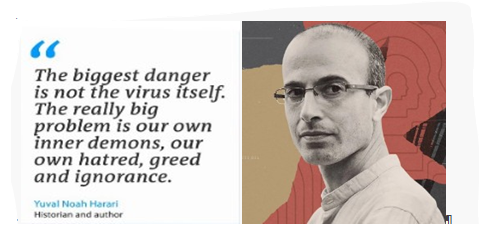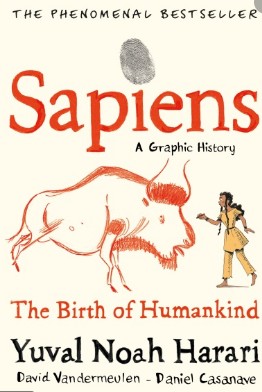|

|
Humankind is now facing a global crisis. Perhaps the biggest crisis of our generation. The decisions people and governments take in the next few weeks will probably shape the world for years to come. They will shape not just our healthcare systems but also our economy, politics and culture. We must act quickly and decisively.
In this time of crisis, we face two particularly important choices. The first is between totalitarian surveillance and citizen empowerment. The second is between nationalist isolation and global solidarity
Today, for the first time in human history, technology makes it possible to monitor everyone all the time.
In their battle against the coronavirus epidemic several governments have already deployed the new surveillance tools. The most notable case is China. By closely monitoring people’s smartphones, making use of hundreds of millions of face-recognising cameras, and obliging people to check and report their body.
Even when infections from coronavirus are down to zero, some data-hungry governments could argue they needed to keep the biometric surveillance systems in place
A self-motivated and well-informed population
|
|
is usually far more powerful and effective than a policed, ignorant population. Consider, for example, washing your hands with soap. This has been one of the greatest advances ever in human hygiene. This simple action saves millions of lives every year.
But to achieve such a level of compliance and co-operation, you need trust. People need to trust science, to trust public authorities, and to trust the media.
A self-motivated and well-informed population is usually far more powerful and effective than a policed, ignorant population
Whenever people talk about surveillance, remember that the same surveillance technology can usually be used not only by governments to monitor individuals — but also by individuals to monitor governments.
We also need a global effort to produce and distribute medical equipment, most notably testing kits and respiratory machines. Instead of every country trying to do it locally and hoarding whatever equipment it can get, a co-ordinated global effort could greatly accelerate production and make sure life-saving equipment is distributed more fairly. Just as countries nationalise key industries during a war, the human war against coronavirus may require us to
|
|
|
“humanise” the crucial production lines. A rich country with few coronavirus cases should be willing to send precious equipment to a poorer country with many cases, trusting that if and when it subsequently needs help, other countries will come to its assistance. We might consider a similar global effort to pool medical personnel. Countries currently less affected could send medical staff to the worst-hit regions of the world, both in order to help them in their hour of need, and in order to gain valuable experience. If later on the focus of the epidemic shifts, help could start flowing in the opposite direction. Global co-operation is vitally needed on the economic front too. Given the global nature of the economy and of supply chains, if each government does its own thing in complete disregard of the others, the result will be chaos and a deepening crisis. We need a global plan of action, and we need it fast. Another requirement is reaching a global agreement on travel.
Suspending all international travel for months will cause tremendous hardships, and hamper the war against coronavirus. Countries need to co-operate in order to allow at least a trickle of essential travellers to continue crossing borders: scientists, doctors, journalists, politicians, businesspeople. This can be done by reaching a global agreement on the pre-screening of travellers by their home country. If you know that only carefully screened travellers were allowed on a plane, you would be more willing to accept them into your country.
Unfortunately, at present countries hardly do any of these things. A collective paralysis has gripped the international community. There seem to be no adults in the room. One would have expected to see already weeks ago an emergency meeting of global leaders to come up with a common plan of action. The G7 leaders managed to organise a videoconference only this week, and it did not result in any such plan. In previous global crises — such as the 2008 financial crisis and the 2014 Ebola epidemic — the US assumed the role of global leader. But the current US administration has abdicated the job of leader. It has made it very clear that it cares about the greatness of America far more
|
|
than about the future of humanity. .
Yet every crisis is also an opportunity. We must hope that the current epidemic will help humankind realise the acute danger posed by global disunity Will we travel down the route of disunity, or will we adopt the path of global solidarity? If we choose disunity, this will not only prolong the crisis, but will probably result in even worse catastrophes in the future. If we choose global solidarity, it will be a victory not only against the coronavirus, but against all future epidemics and crises that might assail humankind in the 21st century.
This extract is from Prof. Yuval Noah Harar’s article. He is considered one of the world’s most influential public intellectuals today.

(This extract is from Prof. Yuval Noah Harar’s article. Mr.Harari is a historian, philosopher, and the bestselling author. He was Born in Israel in 1976 He is considered one of the world’s most influential public intellectuals today.)
|
|
|
|
|
